Is it worth the trouble?
In 1942 Albert Camus wrote a book called “The Myth of Sisyphus”. It is about the one truly important philosophical problem: Given the circumstances of our existence, shouldn’t we just kill ourselves? This is his answer:
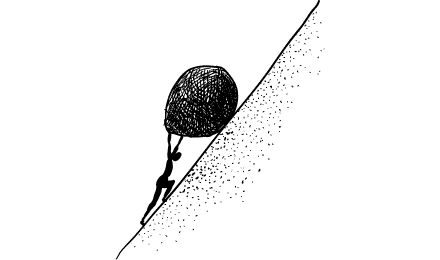
At first Camus describes those moments in our lives when our ideas about the world suddenly don’t work anymore, when every daily routine — going to work and back — and all our efforts seem pointless and misdirected. When one suddenly feels foreign and divorced from this world.

In these frightening moments of clarity we feel the absurdity of life.
Reason + Unreasonable World = Absurd Life
This absurd sensitivity is the result of a conflict. On the one hand we make reasonable plans for our lives, and on the other hand we are confronted with an unpredictable world which does not comply with our ideas.
So what is absurd? Being reasonable in an unreasonable world.
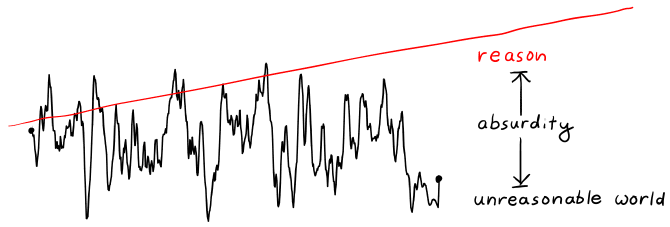
This is the basic conflict we are confronted with. The tension between our reasonable ideas about the world, which collide with what we actually experience over time.
And there is the biggest problem of all: We can boldly declare our ideas about the world as “eternal”, and at the same time we know that our life time is finite. We are all going to die. Yes, you too.
So if reason and an unreasonable world are the key components, then — argues Camus — we could “cheat” and avoid the problem of the absurd by simply eliminating one of the two.
Denying the unreasonable world
One way is to ignore the senselessness of our existence. Contrary to obvious evidence we could pretend that things are stable and live our lives according to distant goals (retirement, the big breakthrough, an afterlife, the progress of mankind, etc.). Camus says, if we do so, we can’t act freely, since our actions are tied to those eternal plans — which more often than not are doomed to shatter in the cliffs of the unreasonable world.
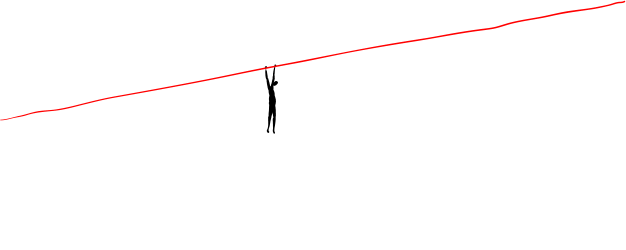
At this point clinging to our reasonable models would not be reasonable anymore. We would be forced to live in denial, we would have to believe.
Abandoning reason
A second strategy to avoid the absurd is to let go of reasoning. Camus mentions different variations of this strategy. He hints at philosophers who either declare reasoning as a useless tool (Schestow, Jaspers) or say that this world follows a godly reasoning which humans simply can’t understand (Kierkegaard).
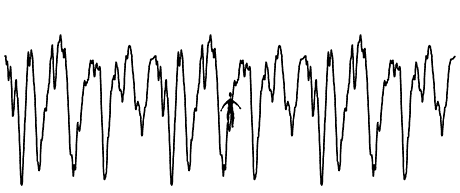
Both ways to avoid the absurd are unacceptable to Camus. He calls any strategy to ignore the problem of absurdity “philosophical suicide”.
Rebellion, Freedom, and Passion
So if “philosophical suicide” is not an option, how about real suicide? Camus can’t justify suicide philosophically. Suicide would be an extreme gesture of acceptance — we would accept the contradiction between our human reason and the unreasonable world. And killing yourself to uphold reason is not really reasonable.
Instead, he suggests we should do three things:
1. Permanent revolution: We should constantly revolt against the circumstances of our existence and thus keep the absurd alive. We should never accept defeat, not even death, even though we know it can’t be avoided in the long run. Permanent rebellion is the only way to be present in the world.
2. Reject eternal freedom: Instead of enslaving ourselves to eternal models we should hold on to reason, but be aware of its limitations and apply it flexibly to the situation at hand — or put simply: we should find freedom here and now, not in eternity.
3. Passion: Most importantly we should always have a passion for life, love everything in it and try not to live as good as possible but as much as possible.
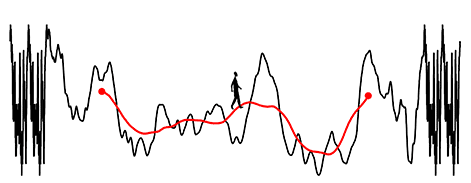
An absurd human knows about his mortality and yet doesn’t accept it, knows about the limitation of his reasoning, yet still holds it dear, feels the pleasure and pain of his experiences and yet tries to take in as many as possible.
Absurd Art — Creation without tomorrow
Albert Camus dedicates the third part to the artist who is fully aware of the absurd. Such an artist would never try to explain or solidify eternal ideas or carefully try to build a legacy that shall stand the test of time. Doing so would deny the unreasonable character of the world.

Instead he favours the absurd artist who lives and creates in the moment, is not attached to just one idea but a Don Juan of ideas, who is ready to abandon any artwork just to move on to his next creative one-night stand. Seen from outside, those painful efforts for the perishable seem to be pointless — and that is the whole point! Artistic expression begins where reason ends.
Why Sisyphus is a happy man
We all know the ancient greek story of Sisyphus who revolted against the gods and was punished as a consequence. He was sentenced to push a boulder up a hill, just to see it roll down again, and keep doing so forever and ever and ever. Camus concludes his book with a surprising, bold statement:
“One must imagine Sisyphus happy.“

He says, Sisyphus is the perfect model for us, since he has no illusions about his pointless situation and yet revolts against the circumstances. With every descent of the rock he makes a conscious decision to give it another go. He keeps pushing that rock and recognises that this is what his existence is all about: to be truly alive, to keep pushing.
If you want to dig deeper
Albert Camus, The Myth of Sisyphus
Before you go
If you enjoyed this article, then subscribe to my mailing list to receive more animated stories!
I think the logic presented sidesteps the question.
The question “Given the circumstances of our existence, shouldn’t we just kill ourselves?” does not depend on reasonableness or absurdity. It depends on suffering and satisfaction.
Given that suffering is different for everyone, it is more logical to presume that the answer should be different for every person. Not based on any particular universal truth, absurd or not.
It is perfectly possible for a reasonable universe – i. e., one with consistent universal laws applied without discrimination – to produce unique circumstances that can seem absurdly cruel. And what works for Sisyphus may, even for someone in the exact same circumstance, not be the right answer, because the object of those circumstances is a different person.
“There is only one really serious philosophical problem,” Camus says, “and that is suicide. Deciding whether or not life is worth living is to answer the fundamental question in philosophy. All other questions follow from that”
If your loved one’s care is the only thing that prevents you from committing suicide, then your life is simply not yours but a perception of it by a select few (i.e., a consideration for the other; selflessness).
There is a concrete reason why you are unable to carry out such a way of living. The inability to withdraw from the love of others is an unwillingness to divorce yourself from this earth. Why fight what is clearly a virtue?
We can only answer the question – is life worth living? if we understand the purpose of life.
It’s time we consider the worldview that each of us is created by the Ultimate being who has told us exactly how we ought to live, therein we find purpose.
Great blog, i’ve been reading lots of your entries and seems to me we think alike, even this, the Albert Camus reflections, are something that i’ve been thinking for a while, specially in this strange years. Really happy i’ve come up with your videos and blogs.
In low times I had thoughts of suicide. Though through reflection I thought no one really knows what is after life.
So live your life to the fullest! Appreciate the joys of life whoever little they may be. And accept the unpredictable, wether it means a struggle, a win or a failure, it all ads up to the experience of living. And to connect with others and see how is goes, sometimes it’s fruitless or frustrating, sometimes creative, sometimes somforting, sometimes it feels like love. Taking riks, big and small, and having a rest when needing to recover.